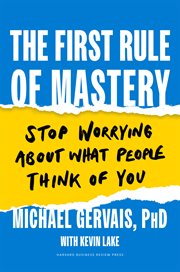The First Rule of Mastery Stop Worrying about What People Think of You
eAudio - 2024
High-performance psychologist Michael Gervais presents a groundbreaking guide for overcoming what may be the single greatest constrictor of human potential: our fear of people's opinions (FOPO). FOPO shows up almost everywhere in our lives-and the consequences are great. When we let FOPO take control, we play it safe and small because we're afraid of what will happen on the other side of critique. When challenged, we surrender our viewpoint. We trade in authenticity for approval. We please rather than provoke. We chase the dreams of others rather than our own. But it doesn't have to be this way. In The First Rule of Mastery, Michael Gervais shows us that the key to leading a high-performance life is to redirect our attention ...from the world outside us to the world inside us. He reveals the mental skills and practices we need to overcome FOPO-the same skills he's taught to the top performers in the world, including sports MVPs, world-renowned artists and musicians, and Fortune 100 leaders and teams. Filled with fascinating stories from the worlds of sports and business, leading-edge science, and insights from the frontier of human performance, The First Rule of Mastery is a much-needed wake-up call that when we give more value to other people's opinions than we do our own, we live life on their terms, not ours.
- Subjects
- Published
-
[United States] :
Ascent Audio
2024.
- Language
- English
- Corporate Author
- Main Author
- Corporate Author
- Other Authors
- Edition
- Unabridged
- Online Access
- Instantly available on hoopla.
Cover image - Physical Description
- 1 online resource (1 audio file (5hr., 02 min.)) : digital
- Format
- Mode of access: World Wide Web.
- ISBN
- 9781663732958
- Access
- AVAILABLE FOR USE ONLY BY IOWA CITY AND RESIDENTS OF THE CONTRACTING GOVERNMENTS OF JOHNSON COUNTY, UNIVERSITY HEIGHTS, HILLS, AND LONE TREE (IA).
Review by Library Journal Review


